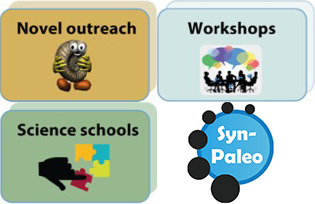TERSANE & PaleoSynthesis
TERSANE - FOR 2332

Temperature-Related Stresses as a Unifying Principle in Ancient Extinctions
Combined with local and regional anthropogenic factors, current human-induced climate warming is thought to be a major threat to biodiversity. The ecological imprint of climate change is already visible on land and in the oceans. The imprint is largely manifested in demographic/abundance changes and phenological and distribution shifts, whereas only local extinctions are yet attributable to climate change with some confidence. This is expected to change in the near future owing to direct heat stress, shortage of food, mismatches in the timing of seasonal activities, geographic barriers to migration, and new biological interactions. Additional stressors are associated with climate warming in marine systems, namely acidification and deoxygenation. Ocean acidification is caused by the ocean’s absorption of CO2 and deoxygenation is a result of warmer water, increased ocean stratification and upwelling of hypoxic waters. The combination of warming, acidification and deoxygenation is known as the “deadly trio”. Temperature is the most pervasive environmental factor shaping the functional characteristics and limits to life and is also central to the generation and biological effects of hypoxic waters and to modulating the effects of ocean acidification, with and without concomitant hypoxia. Due to the key role of temperature in the interaction of the three drivers we termed these temperature-related stressors (TRS).
Paleosynthesis - VolkswagenStiftung

Strengthening Paleontology – The German seed for global cooperation
Paleontology is a small subject at universities. In Germany, there are only 44 professorships scattered across different locations. The fragmentation makes it difficult to develop common visions and research priorities. The initiative of the Volkswagen Foundation for the structural strengthening of “small subjects” focuses on this issue and promotes innovative ideas. The paleontology of the FAU has prevailed with its concept against numerous applicants in the competition. From October 2019, the Volkswagen Foundation will be funding paleontology for the next seven years with almost one million euros.
Prof. Dr. Wolfgang Kießling, Department of Paleoenvironment FAU, and Prof. Dr. Manuel Steinbauer, University of Bayreuth, head the project. They want to support paleontology in German-speaking countries in building networks, identifying common research priorities, and promoting young academies.
The main task is the construction of synthesis workshops. These are working meetings of experts to be held at the FAU. In terms of content, they are jointly designed by all practicing paleontologists. As a result, research groups from all over the world come together to do research. A core aspect of the synthesis workshops is also to develop visions and strategies together. As an example, ‘what are the most important questions of paleontology currently and how can we answer them collectively?’
In addition to the workshops, a mobile app will be developed, which can automatically determine fossils. These can also be used by ordinary persons. In addition, training and innovation workshops will be further developed to further educate students and teachers and promote networking internationally.
